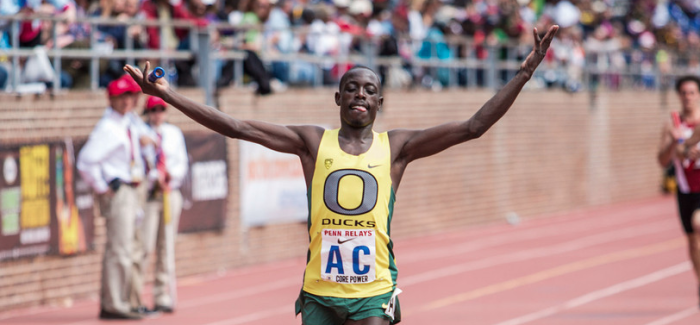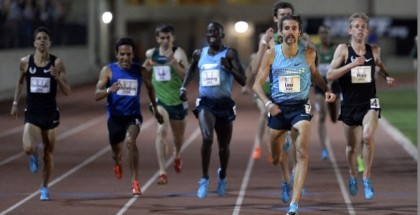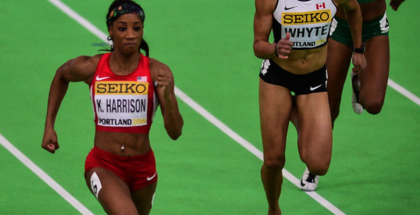Predicting the NCAA Men's Mile
Ben Enowitz | On 13, Mar 2015
“Numbers can ruin a good story.”
–Fred Wilson
Most of the stories going into this weekend’s NCAA indoor mile national championship race have highlighted the matchup between Edward Cheserek and Cristian Soratos. Cheserek, who is only a sophomore, is already an NCAA legend, having won 5 NCAA titles while running for the University of Oregon’s powerhouse program.
Soratos, on the other hand, is making his first championship appearance as a senior and comes from the lesser known (among track fans) Montana State. However, Soratos is the pure miler of the two runners. He is the #1 seed going into the weekend with a time of 3:55.27, undefeated in the mile this season and has demonstrated tremendous finishing speed. Conversely, Cheserek is relatively less credentialed in the middle-distances. He has won all five of his NCAA titles in the distances (2x XC, 1x 3k indoor, 1x 5k indoor and 1x 10k outdoor) and has the slower PR (3:56.43) of the two. On paper, the Cheserek and Soratos matchup seems relatively even, but it also ignores the defending champion, Anthony Rotich, who won the 2014 edition of this race.
Though if recent history has taught us one thing, it is that we should be skeptical of defending champions (Rotich?), #1 seeds (Soratos?) or prohibitive favorites (Cheserek?). Last year Lawi Lalang entered the race as all three. Lalang was the collegiate record holder, defending champion and #1 seed. Yet, Lalang ended up losing to Anthony Rotich and placed second. 2013 was a similar story. Chris O’Hare came into the race as the collegiate record holder, defending champion and #1 seed, but this time it was Lalang who upset the favorite to win the race. O’Hare ended up placing seventh. In 2012 Miles Batty was the collegiate record holder, defending champion and #1 seed. As you may have already guessed, Batty ended up losing to Chris O’Hare and placed third.
So what will be the headline this year? “King Ches reigns supreme”, “Sorato finishes dream season with NCAA title” or maybe “Once again, Rotich proves he is the NCAA’s best”?
Unfortunately, numbers can often times ruin a good story. The Enowitz Calculator does not care about the story heading into the weekend or what would make for a good headline after the race. The Calculator, rightly or wrongly, makes it prediction solely based on the numbers. Rather than an entertaining story line about Cheserek, Rotich and Soratos facing off in the mile, the Calculator predicts that the battle will be between Cheserek, Kentucky’s Keffri Neal and Oklahoma State’s Chad Noelle. Cheserek is the Calc’s #1 pick and it is not close. That being said, spots 2 through 9 are the closest that the Calc has ever seen. If 2015 is anything like the past few years, we know the mile will continue to be the most unpredictable story at the NCAA indoor championships.
—
A quick refresher on the Enowitz Calculator:
The beauty (and frustration when trying to create a model) of the mile is that if they ran the race six different times, it is likely that there could be six different winners. If this were the case, predictions and models would be no more accurate than rolling the dice and the Enowitz Calculator would be nothing more than an effort in futility. Nevertheless, we march forward.
What we try to do:
Quantify the seemingly unquantifiable. For example, there are no formal statistics for being a good kicker or being a “big race” runner. However, we can create proxies for these variables using one’s finishing place at conference races, margin of victories / margin of losses, historical performances in championship races dating back to high school and a number of other variables.
What we do not try to do:
Predict which runners will make the finals. For example, the calculator may think a runner will perform well if he were to make the final, but due to the different race dynamics in the prelims, he may not even make the finals (prelims go out slower than finals and are different based on the fact that runners can qualify on time, thus giving 2nd heat runners an advantage). The calculator does take into effect the fact that some runners in the final will likely be tired from the prelim rounds or from running the DMR / 3k the night before, but it does not try to predict winners of these preliminary rounds.
As in prior years, I will make predictions based purely on the numbers i.e. “The Enowitz Calculator” and then compare the predictions with my gut reaction picks i.e. “The Scout”.
| Place | “The Enowitz Calculator” | “The Scout” | |
| 1 | Edward Cheserek – Long live the King. | Edward Cheserek – Cheserek knows how to win championship races and has the fitness to do so in many ways. | |
| 2 | Keffri Neal – Speed kills in championship races and Neal ran 1:46.39 in the 800 last year outdoors. | Cristian Soratos – Closing a 3:55 mile in 56 seconds is no joke. I don’t think there is another person in the field capable of doing so except Cheserek. | |
| 3 | Chad Noelle – Noelle is the SEC champ and has strong PRs across the board. | Izaic Yorks – Yorks has run well this year and has championship experience. | |
| 4 | Cristian Soratos – There are a lot of things to like about Soratos, but a lack of championship experience is hard to overlook. | Johnny Gregorek – Gregorek was 6th last year and has been even better this year, running PRs in the mile and 3k. | |
| 5 | Anthony Rotich – Defending champ, but he hasn’t looked as good this year. That being said, an 8:21 steeple and 13:34 5k PR is elite. | Chad Noelle – Noelle is in his best form. The key will be getting to the final fresh after running the DMR. | |
| 6 | Izaic Yorks – The MPSF champion has run sub 4 twice this season, winning both races. | Keffri Neal – No one in the field has a faster 800m PR. | |
| 7 | Johnny Gregorek – The former Columbia runner has performed very well this year and Oregon needs the points. | Brannon Kidder – Kidder has the tools to be top 3 and I wouldn’t be surprised to see him be up there. | |
| 8 | Brannon Kidder –Kidder has the speed to compete well in the final, but how tired will the 800m star be after the rounds? | Anthony Rotich – I am sure I will be kicking myself for ranking Rotich so low. | |
| 9 | Sam Penzenstadler – Penzenstadler is experienced in this race, but the Calc docks him for an earlier loss to Noelle and Neal. | Sam Penzenstadler – Penzenstadler was 7th last year, but the field is much deeper this year. | |
| 10 | Patrick Joseph – The redshirt freshman has a great future ahead, but is competing against a historically strong field. | Daniel Winn – Oregon may not be expecting big points from Winn, but they certainly could use them. | |
| 11 | Jake Hurysz – Very strong endurance athlete, but is relatively lacking in speed. | Julian Oakley – Oakley has put together a nice resume this year, including a Big East silver medal in the mile. | |
| 12 | Ahmed Bile – Georgetown has an incredible mid-distance program this year. | Robert Denault – Only 3rd place in the Big East mile, so it is difficult to put him ahead of Oakley. | |
| 13 | Robert Denault – Denault has been consistent in his NCAA career. 3 straight years of running sub 4:00 minutes for the mile. | Ahmed Bile – Bile was “only” 8th in the race where he ran his 3:58.54 PR. | |
| 14 | Julian Oakley – It is surprising to see the #4 seed this low in the Calc rankings. Look for Oakley to outperform. | Jake Hurysz – Colorado has historically performed better in XC than in indoor track. | |
| 15 | Elmar Engholm – Seed time of 4:03.25 (unadjusted for altitude) and the Calc is oftentimes wary of altitude-adjusted times. | Patrick Joseph – Won a fast ACC final in 4:01. Joseph, only a frosh, will be on the list for years to come. | |
| 16 | Daniel Winn — Oregon needs the team points, but will be difficult for all three of their runners to score. | Elmar Engholm – Engholm has a fast 8:49 steeple to his name, but will need to tap into his speed to do well in the final. |



















Submit a Comment